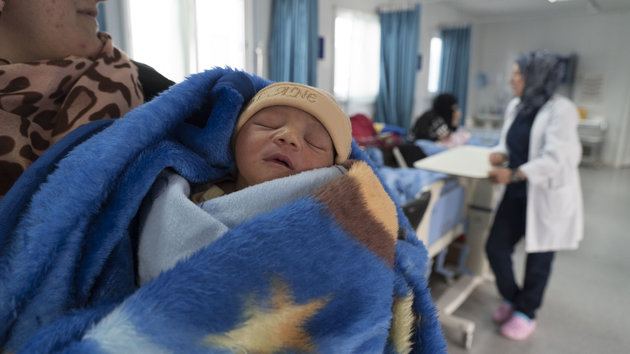Doctors At Syrian Refugee Camp Treating Premature Babies Make Urgent Appeal For Incubator
 |
Rachel Wearmouth 25.12.2017 |
Medics at a Syrian refugee camp urgently need an incubator to ensure the survival of premature babies in their care.
The makeshift hospital at Jordan’s Azraq – a camp home to 53,000 who fled war-torn Syria – is predicting a 70% increase in the birth-rate in 2018 and doctors at its neonatal unit don’t have the facilities to cope.
An intensive care unit (ICU) kitted out with a respiratory incubator is vital, they say, and would mean doctors are not forced separate premature babies from their mums.
As it stands, they have no choice but to rush premature babies to a mainstream hospital to protect them from life-threatening infections.
In most cases, the mum cannot go with her child because of restrictions on refugees’ movements and that means the child misses out on breastfeeding and bonding.
Dr Bakr Alrawashda, who works in neonatal care at the Unicef-sponsored Azraq hospital, said: “We have one incubator to transfer babies outside of the camp. “We don’t have the capability to help babies who are premature and we don’t have a mechanical respirator.
“We simply have to arrange for transportation to ICU outside of the camp and one of the doctors will travel with them.
“Separating the baby from the mother is a problem. It can affect whether the mother is able to breastfeed and that is not good for the baby.
“We want to keep the bonding between the mothers and the babies. We need another incubator to treat these babies and could give much better care for the family here if we had the facilities.
“We are willing to open a Level 1 intensive care unit but we need support.”
The appeal comes as medics anticipate unprecedented demand for their services next year. Thousands of people, many of them expectant mums, will continue to flee across the border from Syria as violence shows no sign of abating.
Dr Alrawashda said the number of births will jump from around 1,500 to 2,500 in 2018 – around 7 births-a-day. Azraq’s pop-up hospital, meanwhile, has just one basic incubator that keeps a baby safe during transit, and its phototherapy settings are limited.
As well as the ICU incubator, the hospital needs more beds, staff and supplies if it is to avoid buckling under the pressure. “The staff are willing to deal with the increase but we need more medical supplies to deal with it,” he said. “We need new beds. Sometimes the wards are full.
“We will need more nurses if we are to open a new natal unit. With medication, we often need more.”
Dr Alrawashda added many Syrian children are genetically predisposed to bronchial asthma.
“Usually in winter we deal with more respiratory cases [in children], infections, bronchitis and asthma,” he said. “We have noticed there is a higher prevalence for bronchial asthma.
“Most of them have positive family history so it may be related to genetic predisposition.
“A cold winter for them is a risk. Bronchial asthma can be exacerbated by this weather.”
Dr Alrawashda also told of how he has treated cases of malnutrition in babies who have just arrived from Syria.
“They can have risk of getting sick much more than other children and it may affect his IQ level in the future,” he said. “Usually we try to deal with them straightaway and give them iron.”


